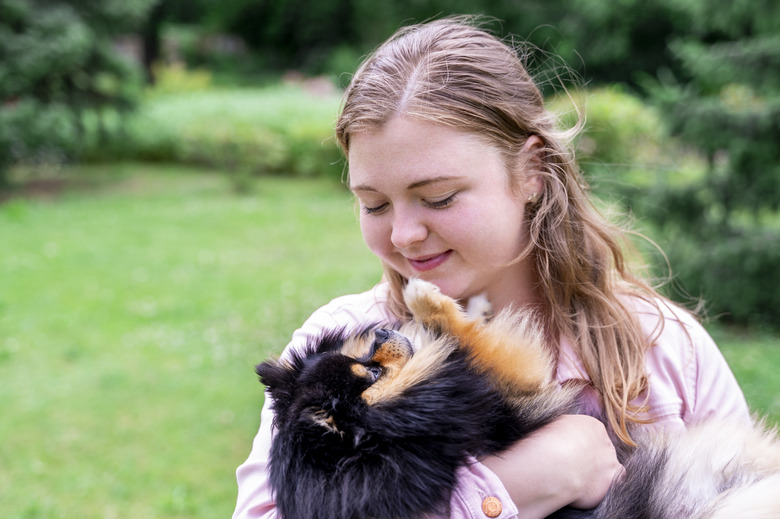Side Effects Of Thyroxine Tablets In Dogs
Thyroxine, also called levothyroxine, is a synthetic thyroid hormone drug. When a dog has low levels of natural thyroid hormones, a veterinarian prescribes thyroxine tablets to replace the missing hormones. The thyroid hormones are important to the dog's health because they control metabolism, energy and the way the body uses food. Thyroxine tablets as hormone replacements are effective with few side effects. Typical side effects that do arise are related to dosage, allergies to the medication or drug interactions.
Symptoms of thyroid problems in dogs
Symptoms of thyroid problems in dogs
Your dog may have thyroid problems at any age. Call your vet when your dog gains weight easily, develops flaky skin and dry hair or has other skin problems. Skin signs may be ringworm rash or lesions on the back and belly, small dark sores on the flanks or yellow scaly layers on the skin. Your dog tires easily and is lethargic because muscles gradually atrophy and fat tissue increases." due to thyroid changes. Your dog may also become less tolerant of cold temperatures.
Diagnosis of a thyroid problem in dogs
Diagnosis of a thyroid problem in dogs
Confirm thyroid gland problems through veterinary examination and lab tests. Your vet tests for thyroid problems by taking a blood sample and testing the thyroid levels. The condition is easily treated with thyroxine, a synthetic form of thyroid hormone. Labs don't provide different normal reference range values based on breed. But dogs that are considered to be sighthounds (greyhounds, whippets, and Irish wolfhounds) can normally have lower thyroid levels compared to other breeds.
Dosage of thyroxine for dogs
Dosage of thyroxine for dogs
Give your dog thyroxine tablets as prescribed. Thyroxine tablets are made in multiple sizes and can be divided for the recommended dose based on the dog's thyroid level and weight. Thyroxine drugs are sold under various generic and brand names. The tablet dose is given twice a day, usually every 12 hours, to maintain a steady hormone level in the body. Thyroxine takes time to build up the hormone level. Thyroid tests are usually given every 30 to 45 days until the right maintenance level is reached.
When you take your pet in to have their blood drawn, make sure that you schedule the blood draw for 4 to 6 hours after you've given them their pill at their usual time. If your pets has missed doses in the days or weeks leading up to the blood draw, the test won't be accurate.
Your dog can overdose if thyroid medication dosage is too high
Your dog can overdose if thyroid medication dosage is too high
Watch your dog for signs of overdose. Too much thyroxine or levothyroxine has the same effect as hyperthyroidism, a condition when the body produces too much thyroid hormone. Signs include hyperactivity, excess water drinking or eating, frequent urination and panting, or faster heart rate. To stop these overdose-related side effects, the veterinarian would reduce the hormone medication to a lower dosage.
Allergy to thyroxine for dogs
Allergy to thyroxine for dogs
Call your vet if your dog has allergic reactions. Such side effects include swelling in the face, a rash, vomiting or cold limbs. An allergic reaction is not a common side effect but is serious. Different brands of thyroid medication, though they have the same main ingredient, can potentially have different effects. Brands may differ by the color dye, fillers, and the way the tablet disperses the drug. Any of these can cause an allergic reaction. Your dog may need a different tablet or brand to avoid the allergy.
Interactions of thyroxine meds for dogs
Interactions of thyroxine meds for dogs
Advise your vet if you give the dog vitamins, supplements or other medications such as for heart problems, Addisons, or Cushing's. Thyroxine may react with the ingredients in these products. The thyroid medication may affect other drugs such as Phenobarbital, which is used for seizures. Side effects may include lethargy, hyperactivity or aggression. Be sure to report any changes in behavior or health to your vet.
In summary
In summary
Remember that thyroxine replaces a hormone your dog needs for health. It is given the rest of the dog's life. Thyroxine is effective and, when given with care, greatly improves the dog's spirit, energy and quality of life.

